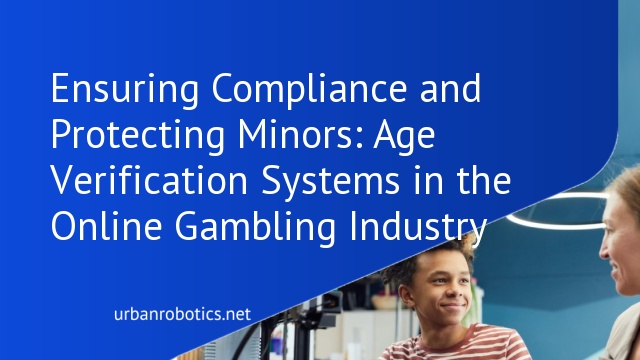Age verification systems play a critical role in ensuring that only individuals of legal age are allowed to participate in online gambling activities. This article explores the importance, methods, regulations, and challenges associated with age verification in this industry.
Why Age Verification Systems Matter
Age verification systems for online gambling are essential in maintaining the integrity of the online gambling industry and protecting vulnerable populations. These systems help to prevent underage gambling, which can lead to various social and economic issues such as increased substance abuse, mental health disorders, and financial problems. By ensuring that participants are legally allowed to engage in gambling activities, these systems uphold regulatory compliance and contribute to a safer online environment.
Age verification is not just about legality; it’s also about social responsibility. The gaming and gambling industry has an obligation to prevent harm to vulnerable players. Children gambling can result in long-term social and economic harms including lost productivity and higher healthcare costs. Effective age verification systems are a critical component of responsible gambling practices.
From a business perspective, gaming operators benefit from robust age verification protocols. Compliance with regulatory requirements reduces the risk of penalties and fines from regulatory bodies. Moreover, it helps in enhancing customer experience, as players feel more secure knowing that they are participating in a well-regulated and fair environment. Regulatory compliance and anti-money laundering (AML) measures are also crucial for maintaining the industry’s credibility.
Methods of Age Verification
Several methods are employed to verify the age of individuals in the online gambling industry. Traditional techniques include the input of birth dates and credit card verification. These methods, while straightforward, are not foolproof and can sometimes be circumvented.
More advanced methods have been developed to improve the accuracy and reliability of age verification:
- Federated Identification: This involves multiple identification sources coming together to verify an individual’s age. It’s a collaborative approach that can significantly reduce errors and fraud.
- Face Recognition Technology: This method uses facial recognition technology to match the user’s face with the photo ID provided. It adds an extra layer of security but can raise privacy concerns.
- Zero-Knowledge Proof: A cryptographic method where one party can prove to another that they know a value (like an age) without revealing the information itself. This method enhances privacy while ensuring that the age verification is accurate.
- Biometric Identity Verification: This involves using fingerprints, retinal scans, or selfies to verify age. It’s highly secure but also comes with privacy concerns.
- Credit Referencing Agencies: These agencies can be used for identity verification by cross-checking the user’s date of birth and other details against their databases.
- Third-Party Age Verification Tools: Companies like Ondato specialize in providing these services, making the process seamless for online gambling platforms.
In all these methods, the emphasis is on balancing security, accuracy, and user experience. While advanced methods offer higher accuracy, they may also involve more complex onboarding processes which could potentially affect the customer experience.
A combination of different techniques can be employed to ensure a robust and reliable age verification system that not only protects minors but also complies with international regulations and standards.
International Regulations and Compliance
Different countries have set varying legal mandates for age verification to ensure minors do not have access to adult content. For instance, Germany and the United Kingdom have specific laws requiring robust age verification systems for certain online activities. In the United States, laws like COPPA (Children’s Online Privacy Protection Act) and specific age verification regulations for adult websites and social media platforms strive to maintain compliance across federal and state levels.
Europe
In Europe, the Digital Economy Act 2017 in the UK mandates stringent age verification requirements for online gambling websites. Here, licensed operators must ensure that age verification processes are in place before new users can deposit funds or play even free-to-play gambling games. Similarly, Germany enforces strict regulatory compliance through robust identity verification protocols to prevent underage gambling.
USA
In the USA, the legal landscape is a mosaic of state-level laws in addition to federal regulations. For example, Utah has stringent regulations with outright bans on most forms of gambling, thus making age verification less relevant in this context. On the other hand, states like Louisiana have detailed requirements mandating age verification for online gaming platforms to protect minors.
Other Regions
In regions like Asia and Oceania, international regulation also plays a significant role. Countries are increasingly recognizing the need for a standard approach to age verification to protect minors from the dangers of underage gambling.
Regulatory bodies across the globe are converging on the importance of age verification systems for online gambling platforms. Legal frameworks are increasingly inclusive of anti-money laundering compliance and fraud prevention alongside age verification to create a more secure and fair environment for all users.
Challenges and Solutions
Implementing effective age verification systems comes with its own set of challenges. Privacy concerns, differing international regulations, and the need for a swift onboarding process pose significant hurdles.
Privacy Concerns
Users often express concerns about how their data is handled during the age verification process. Ensuring transparency about data usage and employing techniques like selective disclosure and zero-knowledge proof can help alleviate these issues.
Regulatory Differences
Differing regulations across countries complicate the standardization of age verification methods. Solutions like federated identification can help create a more harmonized approach. Gaming operators should stay informed about the regulatory conditions in different regions through regulatory consulting and compliance audits.
Technological Solutions
Advancements in AI and machine learning offer promising solutions to streamline the verification process. These technologies can enhance both efficiency and security, ensuring a seamless yet compliant experience for users. Facial recognition technology and biometric identity verification can help detect fraudulent activities and verify identities with a higher degree of accuracy.
Third-party age verification tools are also being employed to improve accuracy and maintain regulatory adherence while protecting user privacy. Companies like Ondato offer specialized services that make age verification both accurate and user-friendly.
Financial Barriers
The cost of implementing robust age verification systems can be a barrier for smaller gambling operators. Identity documents like passports and bank statements can be cross-referenced using data cross-checks to ensure accuracy without incurring too much cost. Additionally, financial status checks can aid in verifying the legitimacy of the user’s identity.
Customer Experience
Balancing thorough age verification with a smooth customer interaction experience is a challenge. Techniques such as selfies and electronic age verification methods can speed up the onboarding process while ensuring compliance with legal obligations.
Online Gambling Age Verification Systems
Age verification systems are indispensable tools in the online gambling industry, essential for both compliance and the protection of minors. Despite facing challenges, innovations like AI and biometric technologies provide effective solutions to enhance the verification process. Robust age verification systems will remain critical to ensuring a safe and legally compliant environment for all users.





